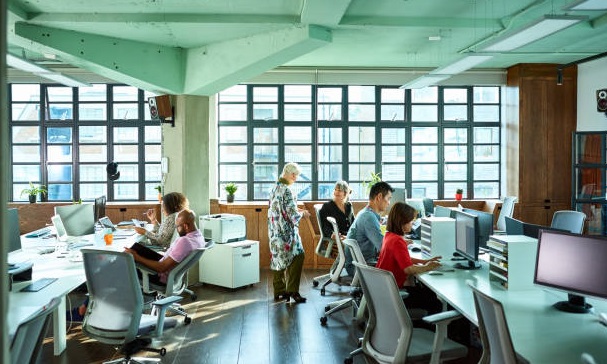The rise of shared office spaces has transformed the traditional workspace, offering an innovative solution to the changing dynamics of how companies collaborate and operate. These spaces, which allow multiple organizations from various industries to work within the same environment, are cost-effective and encourage a culture of interaction and networking. The flexibility of shared office environments fosters a unique opportunity for businesses to collaborate, share ideas, and create synergies across sectors. We will explore how shared office spaces enhance collaboration, drive creativity and productivity across industries, and foster innovation in today’s fast-paced business world.
The Collaborative Culture of Shared Office Spaces
Shared office environments’ physical design and construction encourage team and personal interactions. Unlike conventional office environments in which departments and organizations are segregated, communal spaces promote candid communication and idea cross-pollination. Workers from many sectors, such as marketing firms, legal firms, or digital startups, are sometimes close to one another. Crucially for group projects, this physical proximity fosters a natural setting for impromptu discussions, brainstorming, and problem-solving.
Further breaking down the boundaries between people and teams, these areas sometimes include social amenities including lounges, kitchens, and conference rooms meant to be laid back and inviting. This transparency stimulates innovative ideas by letting people find inspiration from several sectors and points of view. Cooperation is not limited to set meetings; it permeates the daily operations and improves the capacity to address challenging issues using several strategies. After talking about a project with a designer, for example, a developer could discover a novel approach to enhancing their code. Simultaneously, a marketing professional might learn a lot from the viewpoint of a finance manager.
Facilitating Networking Opportunities Across Diverse Industries
Shared office environments have many important advantages, chief among them their rich networking possibilities. Unlike traditional offices, where people usually engage just with colleagues from their sector, collaborative spaces bring together experts from many backgrounds. These multifarious surroundings promote cooperation and cross-industry learning. Small enterprises, freelancers, independent contractors, and bigger companies may all connect and collaborate side by side sharing ideas and growing their professional networks.
These unofficial venues promote natural encounters that might not occur in a more formal or conventional workplace. Casual talks over coffee or brief meetings in common places can inspire fresh team projects or alliances. A graphic designer in a shared workplace might, for instance, get in touch with a digital marketing specialist looking for visual materials for a campaign, therefore fostering a possible corporate cooperation. Moreover, the chance to engage with people from several sectors lets experts learn more about trends and issues that others experience, therefore extending their horizons and methods of approach to problem-solving.
The Role of Technology in Enhancing Collaboration
Many times, shared workplace environments have cutting-edge technologies meant to enhance teamwork. Regardless of their geographical location, high-speed internet, video conferences, and cloud-based applications help teams to be in perfect communication. These technologies simplify connections between people from many sectors, document sharing, and attendance in meetings free from significant travel or difficult logistics.
Including digital technologies in shared office environments also helps real-time collaboration where several people can simultaneously contribute to a document or project independent of their experience or sector of expertise. Through the use of technology, companies are empowered to cooperate effectively, exchange knowledge, and solve problems more precisely. Furthermore, the adaptability of shared office environments allows companies to modify their workplace to fit the requirements of their projects, so guaranteeing the appropriate technology support for several kinds of teamwork. Product prototype teams may need design software, 3D printing gear, or digital whiteboards, all of which are available in public locations.
Cost-Effective Collaboration Across Industries
Startups and small enterprises often prioritize affordability and shared office buildings offer industry-wide collaboration at a low cost. For many businesses, especially considering the expense of maintaining the workplace including electricity, furniture, and technology a typical office space may be costly. By providing a scalable and flexible method of workspaces, shared office environments help to save overhead expenses. Without the long-term financial commitment that conventional office leasing imposes, companies can rent out space a desk, a private office, a whole floor, or even an entire building as needed.
This affordable approach helps companies from many sectors to cooperate free from financial restraints. A company in need of innovative design, for instance, can find a perfect partner in a marketing agency running from the same location. This lets both companies cut individual expenses and distribute resources. By pooling their resources for administrative assistance, security, and cleaning, shared office environments also help businesses concentrate on their main skills and innovation. This cooperative setting promotes cross-industry alliances that might result in mutually advantageous projects and commercial prospects.
More than just a cheap fix for companies, shared office spaces are vibrant ecosystems enabling industry-wide innovation and teamwork. These venues build an environment where companies from several sectors may flourish together by encouraging a culture of openness, providing networking possibilities, and helping technology cooperation. Shared offices help businesses to develop and expand, offer a forum for cross-industry alliances, and inspire innovative problem-solving. Shared office environments are increasingly important in breaking down industry boundaries, promoting dynamic partnerships, and propelling the future of work in a world growingly linked.
If you want morе еxciting contеnt visit. Globallyviz.com














Comments